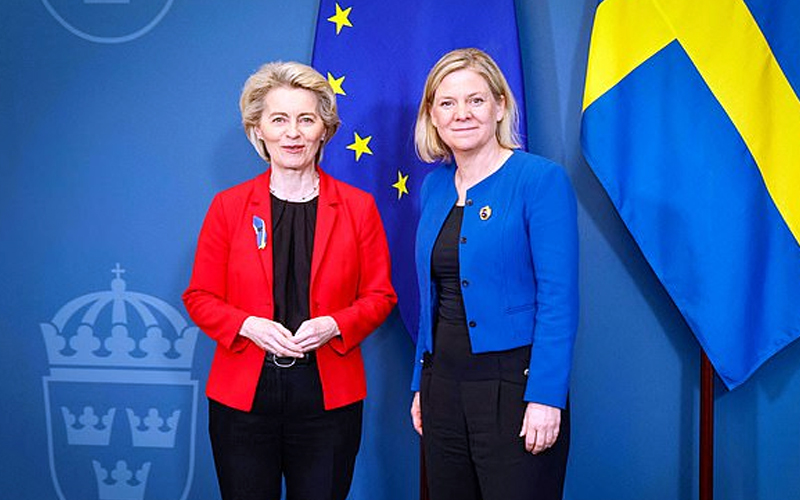 |
| Prior to a discussion on whether to pursue NATO membership in Stockholm, Sweden, on April 13, 2022, Swedish Prime Minister Magdalena Andersson (R) greets Finnish Prime Minister Sanna Marin (L). Image Credit |
Dailymail: The governments of Sweden and Finland have decided to submit NATO applications at the same time, according to two newspapers - one Swedish and the other Finnish - and this will happen in the middle of next month.
The Swedish government has indicated a request to Finland that they apply together in the week beginning May 22, according to the Finnish newspaper Iltalehti, while Swedish government sources verified the information to Sweden's Expressen tabloid.
Following Russia's invasion of Ukraine, Sweden, and Finland, a Russian neighbor, have bolstered their support for NATO membership.
Despite not being members, both Nordic countries work closely with NATO, allowing the alliance's military to conduct exercises on their turf, among other things.
In recent years, Helsinki and Stockholm have significantly increased their bilateral defense cooperation, and there was speculation earlier this month that the Nordic territories might seek to join NATO in the coming months in response to Russian aggression.
Sweden announced its intention to apply for NATO membership on April 13, infuriating Moscow MPs.
The proposal was reported by Sweden's SVD daily on the same day that Finland, a neutral neighbor, began debating whether or not to join NATO after days of speculation.
Magdalena Andersson, Sweden's prime minister, is said to be eager for the country to join the trans-Atlantic alliance by June, much to the chagrin of Vladimir Putin, who attacked Ukraine in part because of the country's ambition to join the agreement.
Despite their close alignment with the West, Finland and Sweden have generally resisted NATO membership in order to avoid provoking Russia.
However, when Russia began the conflict with a barrage of rhetoric about halting NATO expansion, public opinion in the Scandinavian countries shifted dramatically.
According to Swedish sources earlier this month, the Swedish application was expected to be filed before the NATO conference in Madrid on June 29-20, but new information revealed in the Swedish and Finnish press suggests that the deadline may be pushed sooner.
Finland's prime minister, Sanna Marin, stated on April 13 that the country hopes to begin its application process "within weeks, not months."
Despite Moscow legislator Vladimir Dzhabarov's warning that it would spell "the ruin of the country," this has happened.
A report produced by the Finnish government earlier this month looked at the 'fundamentally transformed' security situation in the aftermath of Russia's invasion of Ukraine and formed the basis of parliamentary debates on a future NATO membership application.
 |
| Sweden's Prime Minister Magdalena Andersson (seen with European Union Commission President Ursula von der Leyen on April 7) is expected to join the trans-Atlantic alliance by June of this year. Image Credit |
Less than two weeks ago, Swedish Prime Minister Andersson hosted Finnish Prime Minister Marin in Stockholm for a meeting on their potential alliance memberships.
'There are lots of options to apply (for) NATO membership or not to apply, and we have to analyze these very seriously,' Marin said at the time. But I believe our procedure will be relatively quick, taking only a few weeks.'
The invasion of Ukraine triggered a radical shift in public and political opinion in Finland and neighboring Sweden about their long-standing military non-alignment policies.









0 Comments
please do not enter any spam link in the comment box